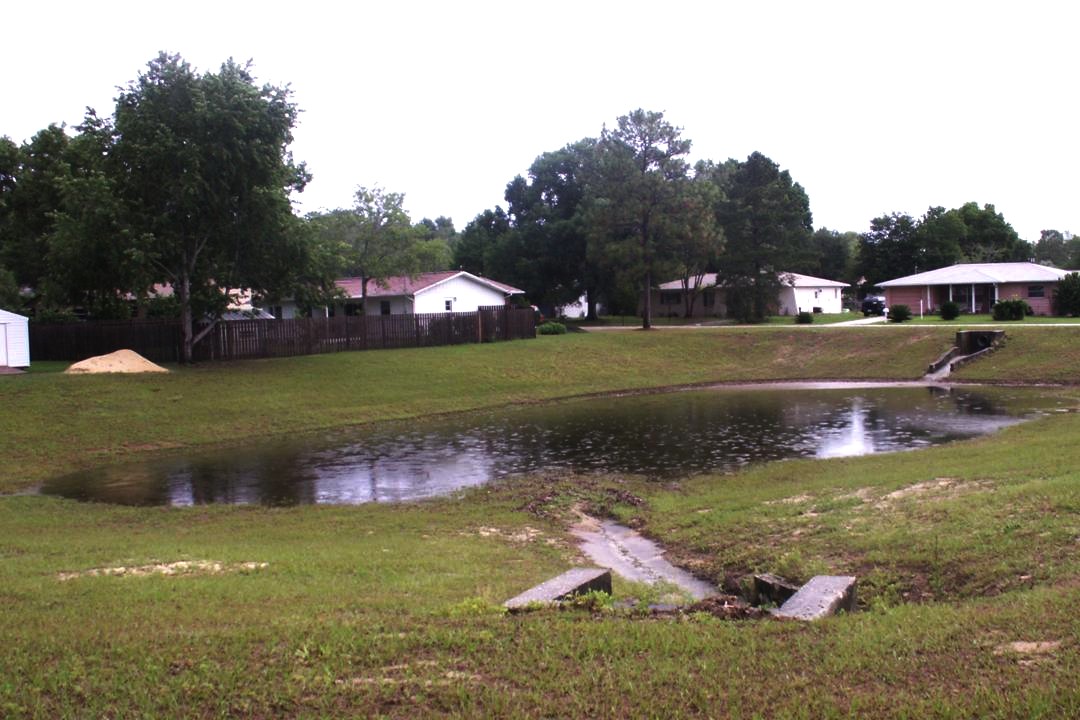A Southern Nor'Easter

I took this photo of the retention pond around the corner from our home shortly after 7 AM (EDT), about five hours before Tropical Storm Alberto made landfall north of us. Rain had just started up again and would become a short downpour a few minutes after I ducked back inside.
Despite the mostly southerly winds we've received, I call Alberto a "southern nor'easter" because I compare its character to the nor'easters I've experienced in Massachusetts. Mary's point of wind reference is California's Santa Anas.
Five hours before I took this photo, between another pair of rain bands, I was crouching in the dark, close to the water, holding my digital recorder out at arm's length. At 2 AM this unassuming pond had become an extraordinary concert hall....
Yesterday, while Citrus County was still in Alberto's crosshairs (before the projected path "cone" moved north of us), I had called our local trash service. The Weather Channel listed us as being under a Hurricane Warning, Inland Hurricane Warning, Flood Watch, and Tornado Watch, all of which continued through the night. The crawl on our TV screen told us that the county's coastal areas were being evacuated along with all mobile homes, and listed the schools that would serve as shelters.
Today is trash day for our block. This morning's paper shows sanitation service as suspended and the county landfill as closed, but I'd been told yesterday that garbage pickup would occur this morning as scheduled.
It did. Our trash collectors merit some appreciation.
Yesterday I had filled our gallon bottles with water in-between bouts of a transcription marathon. My client didn't consider the tapes (which I'd received yesterday morning) to be a rush job, but I did, wanting to e-mail the transcripts ahead of Alberto's arrival. Two years ago we'd lost power for four days with Frances and two days with Jeanne, both of whom came through here as tropical storms.
Mary reminded me that Frances and Jeanne had knocked onto the power lines all those weak branches that had been spared storms for who knows how many years. The stronger stuff that remains has been spared for a mere two years.
We live about 10 miles inland, 90 feet above sea level, in a cinderblock house. Still, Mary had weighted down our rainbarrel screens so that they wouldn't become frisbees in the wind. Forecast yesterday to gust to over 60 mph, late yesterday the projected winds had been downgraded to gusts of around 50 mph.
She took our trash barrel outside around 2AM, then reported back. "Frogs."
I slapped on my sandals, grabbed the recorder, and strode through mist down the block. Click here to access the (.wav file) performance.
That high, screaming trill is the song of Southern Toads (Bufo terrestris; I photographed this Southern Toad around the corner from our supermarket back in March). Even indoors, with doors and windows closed and watching the Weather Channel, I could occasionally hear them.
I believe the underlying chorus includes Eastern Narrow-Mouthed Toads (Gastrophyrne Carolinensis) and possibly Bullfrogs (Rana Catesbeiana). Song IDs come courtesy of Lang Elliott, NatureSound Studio and Smithsonian Folkways Recordings.
Yesterday afternoon a different species performed in this same spot. I'd heard a small group of Squirrel Treefrogs (Hyla squirella), far fewer than those heard on May 10 at the retention pond by the supermarket. This past Saturday night our "post office pond" had been raucous with Southern Toads, Green Treefrogs (Hyla cinerea), and Barking Treefrogs (Hyla gratiosa).
As simple as our corner retention pond might appear, it's a careful feat of engineering. Normally this one stays dry or doesn't hold rainwater for long. A well-built retention pond will drain completely in three days at most, leaving no standing water to harbor mosquito larvae, yet it will be shallow enough so as not to overburden the substrate and become a sinkhole.
In 2004, when Frances had dumped 18 inches of rain over the course of four days (by our rain gauge measurements), this pond was about a foot short of cresting. Sure enough, it had drained completely three days later.
The video below dates from Sunday afternoon (background commentary is Mary's), when that day's deluge gave us a preview of Alberto.
Why Did The Ibises Cross The Road?











1 Comments:
To get out of the hurricane's path...or because the road had turned into a waterway?!
Is everything okay now. Guess I'll hear with tonights news.
Post a Comment
<< Home